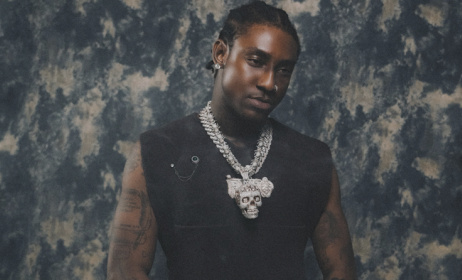In conversation with Ibejii
Ibejii, a London-born, Afro-fusion artist of Nigerian origin, released his latest album Ilu Ilu on 12 June. The album mixes Afro-jazz, rock and soul, and flirts with Yoruba folklore. This music places him in the category of artists best described as freethinkers – unconventional and radical.
 Ibejii.
Ibejii.
Very little is known about Ibejii. All he has shared is that he has a twin brother, and that he grew up listening to rock, juju, electro, jazz and R&B. He caught the attention of Nigerian fans with the release of 'Ayanfe' in 2016. The following year, he launched the first edition of the Ibejii Live Experience, which features alternative artists and coincides with Nigeria's Democracy Day on 12 June.
Ilu Ilu follows the simultaneous release of GreenWhiteDope 001 and GreenWhiteDope 002 – his debut albums – in 2017. Tribal Marks and MSML were released in 2018 and 2019.
The new project is an expression of Ibejii's environment, emotions and background. It also invites fans to join his journey of self-discovery – one that embraces hope and promise, but also self-doubt and diffidence.
Ibejii recently spoke with Music In Africa about Ilu Ilu.
MUSIC IN AFRICA: Could you talk about the use of English and Yoruba in your music?
IBEJII: I have always mixed Yoruba and English, but I confess that I am more comfortable singing in Yoruba. In this project, Yoruba is my predominant language and English is secondary.
You have recorded and released several projects over the years. What makes Ilu Ilu different?
Ilu Ilu is the documentation of an era, a season, a place and a time of reflection, and introspection. Its release couldn't be more significant, as it comes in reflection upon a season that we haven't experienced before as a people. So yes, Ilu Ilu is tied inextricably to the COVID-19 pandemic.
What sources – musical, biographical or mythical – did you draw from to make the album?
First and foremost, my journey as an international citizen born and raised in the West but endowed with the rich and deep Yoruba culture. Secondly, my readings and my writings.
Over the years you have created an air of mystique about who Ibejii really is. Are you willing to give us more about your background?
Ibejii is principally a sound, a phenomenon, Ibejii is less man and more persona. Ibejii is less celebrity and more 'journey'. So it's not about the man but more about the music. It's not that there is anything hidden, but the idea here is to speak about the music rather than the character behind the music.
On your song 'Lekelele' you ask for the old times to return. What is your relationship with nostalgia and are there specific moments you would like to return to?
It is not so much about returning but recalling. The beauty of the human mind is that we can tap into the best moods – into childhood, the age of innocence, a season where doubt was limited and hope was at its brightest.
The album appears to have a very strong visual element and could be described as cinematic. Was this intentional?
Ibejii lives in stories. Storytelling is what Ibejii does best. So almost all my works have been cinematographic or at the very least thematic. Thematic is telling stories through wild and broad images, which take you on journeys.
What are your thoughts on Nigerian music today and your place in it?
Nigerian music is awesome. I love Nigerian music of all forms. However, I like to think that my journey is about telling stories. I would say my music is a little more mature, more introspective, more reflective. I hope that space for it grows over time.
How do you see your work in relation to the COVID-19 pandemic? Do you think art has a place at a time of crisis?
Absolutely. There cannot be a better time to dig into reflection art. Culture is all about reflection and this is a season of reflection. It is a time when all of us are having to look deep within to express more compassion, to care more about those around us. This is a time for introspection, and I like to think that musicians like myself have a bigger opportunity to express and engage.
Could you tell us about the motivation and meaning behind the songs 'Omo Olu Iwa' and 'Troubled Soul'?
'Omo Olu Iwa' derives from me being disgusted with the leadership of the world's biggest power, the US. For decades, it has sought to denigrate people based on ethnicity, race and religion. The song is a reminder to people to hold tight to their culture, values, and looks – we are beautiful just the way we are.
'Troubled Soul' is a very meaningful song to me. I am a big lover of Marvin Gaye – his works, the pain and troubles. For me, they are reflective of what drives most creatives. We all come from a broken place. We are shattered glass, in my view, and this song preaches to those who are broken like Ibejii. The message is that you are not alone.
Now that the album is out, what can we expect next from the unusual mind of Ibejii?
Ibejii is going to be doing something a little bit different between 2021 and 2022. I am looking to use highlife and fast beats to drive sound. So I want to see if I can make people dance next year and bring joy and happiness.
Stream Ibejii's Ilu Ilu here.





























Comments
Log in or register to post comments